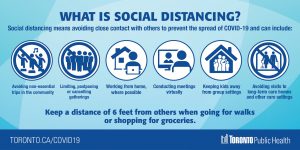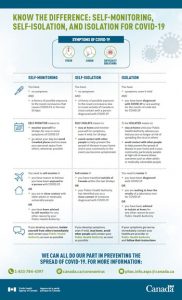 This isn’t a blog post telling you how your safety is important to me and that I’ve “doubled down” on my (jargon) cleaning efforts, although it is, and I have.
This isn’t a blog post telling you how your safety is important to me and that I’ve “doubled down” on my (jargon) cleaning efforts, although it is, and I have.
These are uncertain times, but I know you’re getting the latest updates on this pandemic from trusted sources like the Public Health Agency of Canada, U.S. Centers for Disease Control and Prevention and World Health Organization.
So let’s instead take a look at the language of COVID-19 and a clear explanation of the words we’re seeing far too often every day.
First, the jargon and potentially confusing words and phrases. These are the ones to avoid or explain:
- Abundance of caution: Everyone is saying this, so it’s already become a cliché. Abundance is “a very great quantity, considered to be more than enough.” Why not say, “We’re being particularly cautious”?
- Already elevated cleaning and sanitization protocols: Companies that tell us they’re already diligent about cleaning and are stepping up their game mean to be reassuring. But it’s meaningless if we don’t know how diligent they were and how that’s changed. How often do they scrub? What do they scrub? With what?
- Asymptomatic: Showing no symptoms. (How hard is that to say?)
- Comorbidities, comorbid conditions: Underlying or additional health conditions, like cancer or heart disease.
- Double down: Some companies are doubling down on their cleaning efforts; good for them. In blackjack, it means doubling a bet, and the meaning has been expanded to strengthening your commitment to a strategy or action, often risky. It’s pretty vague, though. If their cleaning efforts were minimal before, will doubling do much? (See Already elevated cleaning and sanitization protocols.)
- Efficacy: The ability to get a job done. In medical terms, it means how a medication performs in a controlled setting. For the general public, a better word is probably effectiveness.
- Exponential growth or spread: The virus multiplies rapidly. You’re allowed to say that.
- Heightened safety precautions: This is meaningless unless we know your regular safety precautions. See already elevated cleaning and sanitization protocols.

- Impact: Could we please just say “affect”? Teeth are impacted, not people.
- Mitigate: Make milder or less intense, dampen or give relief from.
- Protocol: Official procedure or rules to follow.
And here are the words we may not have been too familiar with before, but my goodness, aren’t they everywhere in just a week or two?
- Coronavirus: A family of viruses named for the crownlike spikes on their surfaces that help them invade cells.
- COVID-19: COronaVIrus Disease 2019, the name of the disease caused by the latest/novel/new coronavirus.
- Epidemic: When a disease spreads over a wide area and many people become ill at the same time.
- Flatten the curve: Slowing the rate of infection, which would strain the healthcare system and lead to more deaths. See social distancing.
- Hunker down: Hide or take shelter.
- Isolation: When you have symptoms, however mild, and have been diagnosed with COVID-19, stay away from everyone.
- Lockdown: Confining of prisoners to their cells, or all of us hunkering down to help prevent the spread of COVID-19.
- Novel coronavirus: Means no one in the world has antibodies to it because no one has ever been infected by it before, so everyone is at risk of catching the virus.
- Pandemic: An epidemic that has spread worldwide.
- Preventive (no need for the extra syllable in preventative, according to both CP Stylebook and AP Stylebook): A measure to prevent disease or a breakdown of something.
- Physical distancing: Reducing close contact between people to slow the spread of COVID-19. See Social distancing.
- Quarantine: Restricting the movement of healthy people who may have been exposed to an infection.
- Self–assessment: Worried about whether you need treatment? Ontario has a self-assessment page that outlines the symptoms (fever, coughing, difficulty breathing) and circumstances that might mean getting a medical opinion.
- Self-isolation: You don’t have symptoms but might have been exposed to the virus due to travel or close contact with someone diagnosed with COVID-19. Stay home and avoid others for 14 days and watch for symptoms. Goes along with quarantine.
- Self-monitoring: You don’t have symptoms but monitor yourself for 14 days in case you’ve been exposed to someone with COVID-19. Avoid crowded places.
- Sheltering in place: Part of social distancing, where you only leave the house if you really need something, like groceries or medication. (Adding for a friend – Fit the chocolate or wine into the run for antiseptic wipes or milk.)
- Social distancing (sometimes called Physical distancing): Reducing close contact between people to slow the spread of COVID-19. Stay out of crowded public places, cancel large gatherings, limit non-essential travel and stay two metres/six feet away from others. (See a terrific simulation of the difference social distancing can make.)
Over the past week, I’ve received plenty of messages from every company who has my email. Among the best lines are these reminders of the importance of staying human:
“Our people are the heart of our business, and we are a team operating in uncertain times. While we are open, this is not business as usual. I am grateful for your continued understanding and patience.” – George Soleas, President and CEO of LCBO
And this:
“First and foremost. Do not worry. We are not running out of food or essential supplies. Our supply chain and store teams are responding to the spikes in volume and quickly getting the most important items back on the shelf. …Be kind to each other. We will get through it.” – Galen Weston, CEO of Loblaw
I’m hunkered down. You probably are too. We’re doing this for a reason and it WILL make a difference. Stay safe and healthy. This too shall pass.

Thanks, Sue. Great post! And thanks for sharing the simulitis simulation. Serious!
Stay safe and well,
Thanks, Jeannine! Isn’t that simulation wonderful? Stay well too!
Yes, the simulation was very interesting. It raised a question in my mind as to whether you really can be reinfected. A little on-line reading, albeit relatively early days for evidence, makes it sound like it is possible but unlikely.
That’s probably one of the many things we are going to find out over the coming weeks and months.
It’s been so interesting to see the tone that companies are taking and how they are communicating (and how much!). While their emails are sometimes longer, I have been so impressed with the messaging from Loblaws/Shoppers/etc. It’s real and doesn’t have a corporate spin feel to it. Hope you are doing well!
Hi Nadine, all is well here and hope the same for you! Yes, I read every email that comes in and look at with a communicator’s eye. Agree Loblaw is doing a great and human job. What other impressive messages have you seen?